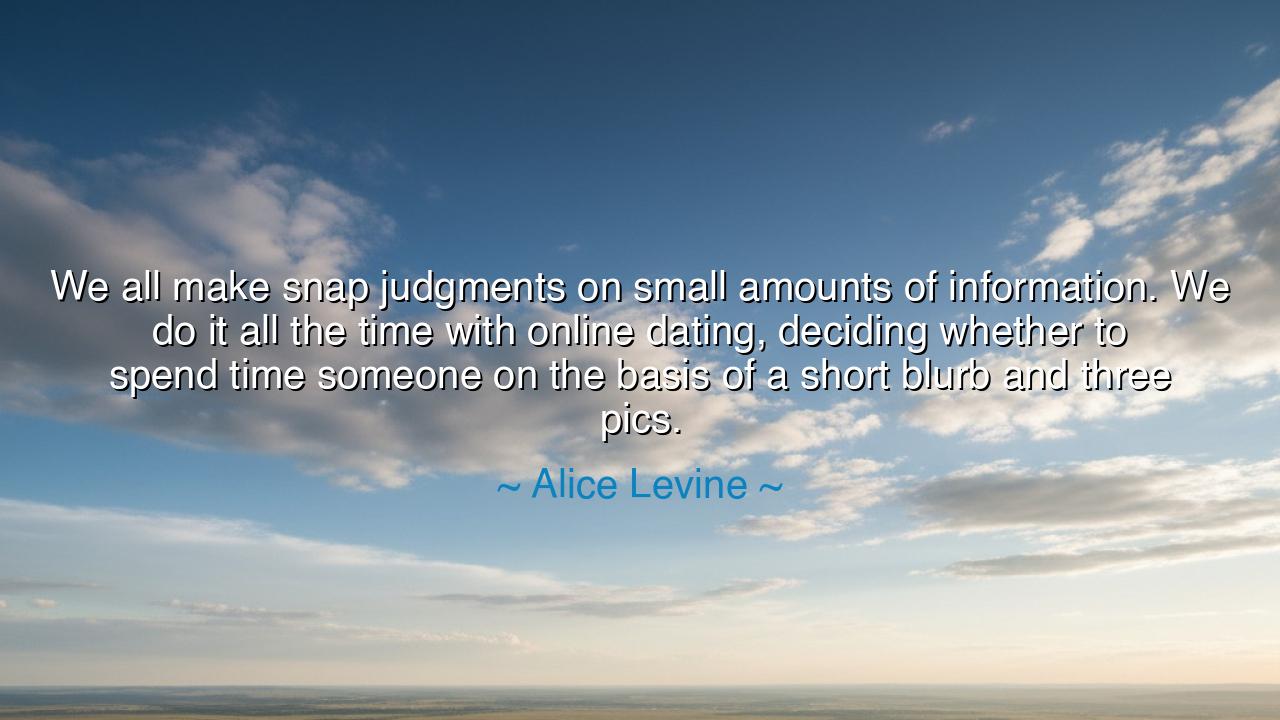
We all make snap judgments on small amounts of information. We do
We all make snap judgments on small amounts of information. We do it all the time with online dating, deciding whether to spend time someone on the basis of a short blurb and three pics.






In the words of Alice Levine, “We all make snap judgments on small amounts of information. We do it all the time with online dating, deciding whether to spend time with someone on the basis of a short blurb and three pics.” — there resounds a truth both ancient and unchanging: that human beings are creatures of instinct, quick to decide and slow to reflect. Beneath her modern imagery of screens and profiles lies a wisdom that has echoed through centuries — that the heart and mind often move faster than reason, and that from fleeting impressions we build castles of opinion, trust, and sometimes regret.
In her reflection, Levine speaks not merely of online dating, but of the human condition itself. To live is to judge, to discern, to choose among endless possibilities. The world presents us with fragments — a face, a tone of voice, a gesture — and from these fragments we weave entire stories. In ancient times, men did this by firelight, studying the stranger who entered the village. Today, we do it through pixels and words on a screen. The form has changed, but the impulse is eternal. We seek to understand quickly because time and emotion are precious, and the heart fears waste. Yet in this haste lies both the strength and the folly of humankind.
The origin of her observation lies in our digital age, where encounters are brief, and choices infinite. In the realm of online dating, the art of human connection has been compressed into moments — a glance, a swipe, a choice made in seconds. Levine, with her characteristic wit and clarity, reminds us that this habit of judgment is not new, only amplified. For even in the ancient marketplaces of Athens or the royal courts of China, men and women made swift assessments based on appearance, status, or speech. The difference now is that technology has multiplied the pace — and in doing so, has revealed how little we truly know when we think we know enough.
Consider the story of Diogenes, the Greek philosopher who carried a lantern through the streets in daylight, searching for an honest man. Many laughed at him, judging him mad. Yet history remembers him not as a fool, but as a seeker of truth — one who refused to accept appearances as substance. In this way, Levine’s insight mirrors his quest. We, too, wander through the light of endless profiles, convinced that our brief glances reveal character. We forget that truth hides behind layers unseen, and that first impressions, while powerful, are rarely complete.
And yet, her words are not an accusation, but a revelation — that such snap judgments are part of what makes us human. They are born of survival, of instinct honed through ages. When danger lurked in the forests and caves, the ability to decide swiftly saved lives. To read intent in an expression or trust in a gesture was wisdom, not folly. But in the modern age, where the greatest dangers are not of tooth or claw but of misunderstanding and haste, we must evolve beyond instinct alone. We must learn to pause before deciding, to allow curiosity to follow where judgment once ruled.
In every human story lies this tension between appearance and essence. Think of Socrates, whose unremarkable face concealed a mind that transformed philosophy; or of Abraham Lincoln, once mocked for his plainness, yet later revered for his depth of spirit. These lives remind us that greatness and goodness often hide behind humble veneers. The wise, therefore, do not stop at the surface. They look again, they listen longer, they seek the truth beneath the image. For every person, no matter how ordinary they may seem, carries an unseen richness waiting to be discovered by those patient enough to see it.
Thus, the lesson of Alice Levine’s words is timeless: judge if you must, but judge with humility. Remember that your first thought may be a spark of instinct, not the flame of truth. In love, in friendship, in every meeting, resist the urge to define before you understand. Look beyond the blurb, beyond the picture, beyond the story someone has crafted of themselves. For the heart that learns to wait before deciding will find treasures hidden from the impatient.
And so, my children, carry this wisdom into your own lives: the eye sees swiftly, but the soul must see slowly. In every face you encounter — whether on a screen or in the street — there lies a universe unseen. Do not let haste blind you to wonder. Be deliberate in your discernment, generous in your curiosity, and slow to close the book on a story you have only just begun to read. For in doing so, you honor not only others, but the deeper, nobler part of yourself — the part that remembers that every soul, like every song, deserves more than a glance before it is understood.






AAdministratorAdministrator
Welcome, honored guests. Please leave a comment, we will respond soon